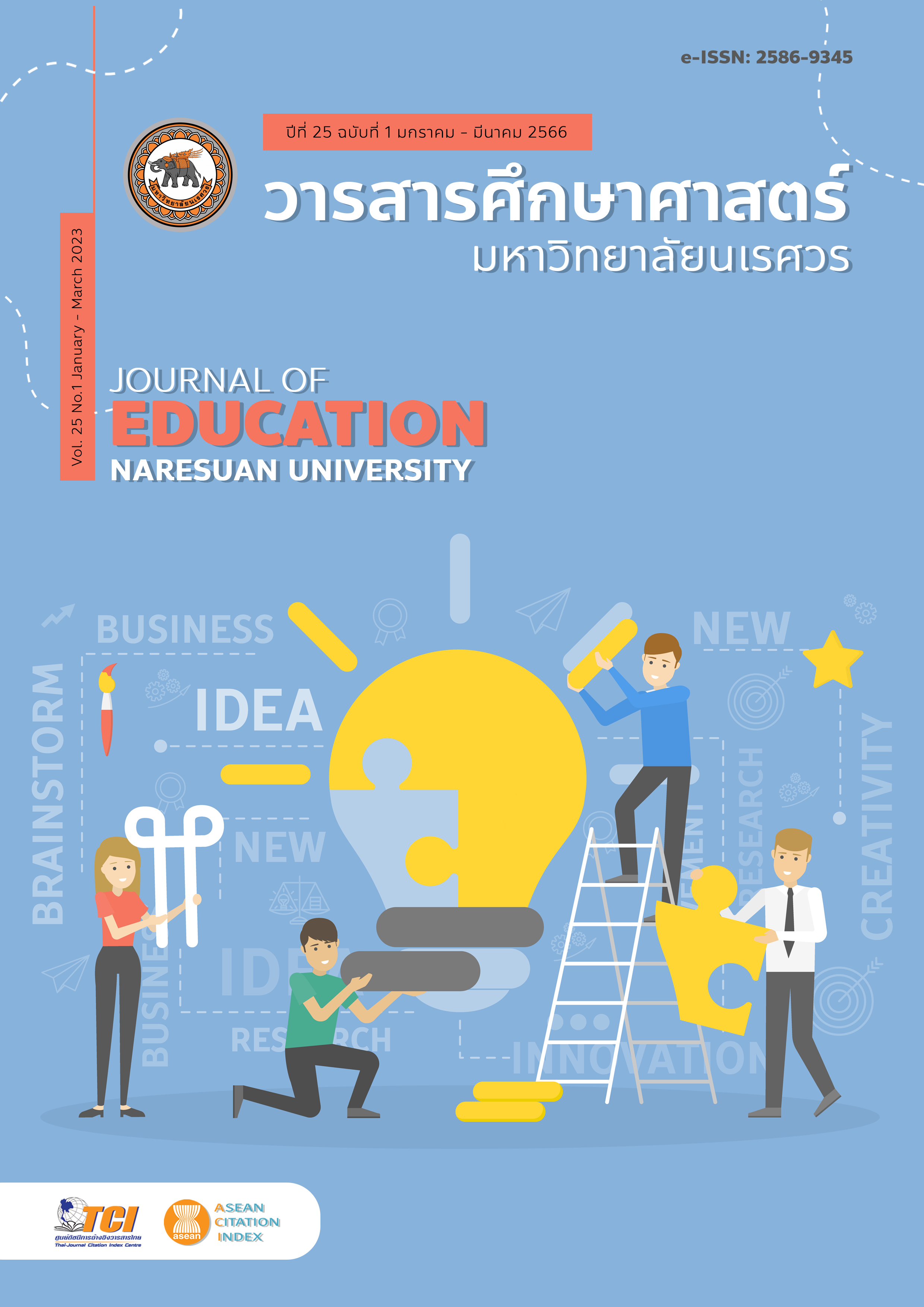DEVELOPMENT OF ORGANIC CHEMISTRY LABORATORY LESSON WITH TRANSITION INQUIRY-BASED LEARNING IN BASIC ANALYSIS OF ORGANIC COMPOUNDS FOR UNDERGRADUATE STUDENTS การพัฒนาบทปฏิบัติการเคมีอินทรีย์แบบเลื่อนระดับการสืบเสาะหาความรู้ เรื่อง การวิเคราะห์สารประกอบอินทรีย์เบื้องต้น สำหรับนักศึกษาระดับปริญญาตรี
Main Article Content
Abstract
The purpose of this research were: 1) to find the effectiveness of organic chemistry laboratory lesson with transition Inquiry-based learning, 2) to study the scientific Inquiry skills of the students, and 3) to evaluate the satisfaction of the students. The sample consisted of 16 first-year undergraduate students and obtained a purposive sampling. The implementation was eight hours. The research tools were the organic chemistry laboratory lesson with transition inquiry-based learning, a rubric for assessing scientific inquiry skills, a scientific inquiry skills test, and a questionnaire for students' opinions on the organic chemistry laboratory lesson with transition inquiry-based learning. The data were analyzed using descriptive statistics. The results of the study were as follows: 1) the effectiveness of organic chemistry laboratory lesson was 80.14/80.25, 2) students have a high level of scientific Inquiry skills ( = 2.40, SD = 0.16), and 3) students have the highest level of satisfaction with organic chemistry laboratory lesson (
= 4.79, SD = 0.41).
Article Details

This work is licensed under a Creative Commons Attribution-NonCommercial-NoDerivatives 4.0 International License.
The owner of the article does not copy or violate any of its copyright. If any copyright infringement occurs or prosecution, in any case, the Editorial Board is not involved in all the rights to the owner of the article to be performed.
References
Buck, L. B., Bretz, S. L., & Towns, M. H. (2008). Characterizing the level of inquiry in the undergraduate laboratory. Journal of College Science Teaching, 38(1), 52-58.
Chooruk, J., Ratanawimanwong, N., & Dornbhundit. P. (2014). Development of an analytical chemistry Laboratory course with use of home-made colorimeter for undergraduate student. Journal of Science and Technology Mahasarakham University, 33(6), 657-664. [in Thai]
Collison, C. G., Kim, T., Cody, J., Anderson, J., Edelbach, B., Marmor, W., Kipsang, R., Ayotte, C., Saviola, D., & Niziol, J. (2018). Transforming the Organic Chemistry Lab Experience: Design, Implementation, and Evaluation of Reformed Experimental Activities—REActivities. Journal of Chemical Education, 95(1), 55–61. https://doi.org/10.1021/acs.jchemed.7b00234
Hale-Hanes, C. (2015). Promoting student development of models and scientific inquiry skills in acid-base chemistry: An important skill development in preparation for AP chemistry. Journal of Chemical Education, 92(8), 1320–1324.
Laredo, T. (2013). Changing the first-year chemistry laboratory manual to implement a problem-based approach that improves student engagement. Journal of Chemical Education, 90(9), 1151−1154
Lorenzo, M. G., Reverdito, A. M., Blanco, M., & Salerno, A. (2012). Difficulties of undergraduate students in the organic chemistry laboratory. Problems of Education in the 21st Century, 42(1), 74-81.
Lott, K. (2011). Fire up the inquiry. Science and Children, 48(7), 29-33.
National Research Council. (2000). Inquiry and the national science education standards: A guide for teaching and learning. Washington, DC: National Academy Press.
Office of the Higher Education Commission. (2012). Announcement of the ministry of education on bachelor's degree qualifications science and mathematics B.E. 2554. Bangkok: Ministry of Education. [in Thai]
Thitivorn, Y., Jittangprasert, P., Pumsa-ard, K., & Dornbundit, P. (2018). Development of an analytical chemistry laboratory on capillary electrophoresis technique to Investigate undergraduates' learning efficiency. Journal of Research Unit on Science, Technology and Environment for Learning, 9(1), 16-27. [in Thai]
Ural, E. (2016). The effect of guided-inquiry laboratory experiments on science education students' chemistry laboratory attitudes anxiety and achievement. Journal of Education and Training Studies, 4(4), 217-227.
Volkmann, M. J., & Abell, S. K. (2003). Rethinking laboratory tools for converting cookbook labs into inquiry. The Science Teacher, 70(6), 38-41.
Weaver, M. G., Samoshin, A. V., Lewis, R. B., & Gainer, M. J. (2016). Developing students' critical thinking, problem solving, and analysis skills in an inquiry-based synthetic organic laboratory course. Journal of Chemical Education, 93(5), 847–851.
Whitworth, B. A., Maeng, J. L., & Bell R. L. (2013). Teacher's toolkit: differentiating inquiry. Science Scope, 37(2), 10-17.
Winkelmann, K., Baloga, M., Marcinkowski, T., Giannoulis, C., Anquandah, G., & Cohen, P. (2015). Improving students' inquiry skills and self-efficacy through research-inspired modules in the general chemistry laboratory. Journal of Chemical Education, 92(2), 247-255.
Wu, J. (2013). Mutation-based learning to improve student autonomy and scientific inquiry skills in a large genetics’ laboratory course. CBE—Life Sciences Education, 12(3), 460-470.
Xu, H., & Talanquer, V. (2013a). Effect of the level of inquiry on student interactions in chemistry laboratories. Journal of Chemical Education, 90(1), 29-36.
Xu, H., & Talanquer, V. (2013b). Effect of the level of inquiry of lab experiments on general chemistry student' written reflections. Journal of Chemical Education, 90(1), 21-28.
Zion, M., & Mendelovici, R. (2012). Moving from structured to open inquiry: Challenges and limits. Science Education International, 23(4), 383-399.


